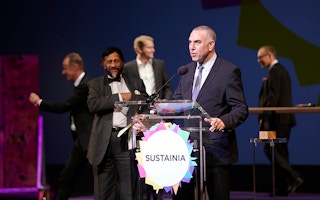Copenhagen - Around the world, some 25 to 30 per cent of global water supply worth $14 billion is wasted in the water distribution process.
To continue reading, subscribe to Eco‑Business.
There's something for everyone. We offer a range of subscription plans.
- Access our stories and receive our Insights Weekly newsletter with the free EB Member plan.
- Unlock unlimited access to our content and archive with EB Circle.
- Publish your content with EB Premium.
Setting out to solve this problem, one Israeli firm, TaKaDu, created a software solution that analyses complex raw data from utilities to detect issues such as leaks, bursts and pressure issues earlier, resulting in a reduction of water wastage.
For the way it has revolutionized how utilities manage their water supply and helping to save the world’s precious resource, TaKaDu won the Sustania Award on Thursday night at a ceremony in Copenhagen attended by 1,000 guests.
“The Sustainia Award winner is a great example of the solutions we need. With an advanced technology, they help address a serious issue facing many communities, scarcity of water. They are true green action heroes,” says former California governor Arnold Schwarzenegger, chair of the Sustainia Award Committee.
TaKaDu chief executive Amir Peleg told Eco-Business at the ceremony that the company was surprised to win the award. “It’s emotional and we’re very excited. The award will help raise awareness on the water sector and the importance of reducing water wastage,” he said.
The award, which honours the world’s best sustainability innovation, is initiated by Copenhagen-based sustainability think tank, Sustainia, in collaboration with Schwarzenegger’s initiative Regions20, UN Global Compact and the EU Commission.
Dr. Rajendra K. Pachauri, chair of the UN climate panel, IPCC, who presented the award to Peleg commended TaKaDu’s “state of the art technology” as an “excellent solution to how we can optimize our most valuable resource: Water.”
“
It’s emotional and we’re very excited. The award will help raise awareness on the water sector and the importance of reducing water wastage.
Amir Peleg, TaKaDu
TaKaDu’s winning innovation monitors water grids and warns suppliers of leakages, pipe bursts or other irregularities. The software, which is cloud-based and accessible from any mobile device, is also used to support long-term planning that saves utilities time and money and protects water supply.
The award committee formed by Schwarzenegger, Dr Pachauri, former prime minister of Norway Gro Harlem Brundtland, and EU Commissioner for Climate Action Connie Hedegaard, said its technology helped it to stand out among the more than 500 projects submitted from 79 countries.
The ceremony also crowned another winner - Liter of Light, an enterprise in the Philippines that provides solar light for off-grid housing.
It won the Sustainia Community Award Winner 2013 for receiving the most number of votes from the public.
Its solar lamp can be made for just $2 using only a plastic bottle filled with water, and a small amount of bleach to keep the bottle algae-free. The first Liter of Light lamp was installed in a home in Laguna in the Philippines in 2011, and the innovation has since then grown to 350,000 lights spread over 10 countries.
Since it began, 370 grassroots entrepreneurs have been trained by Liter of Light to install the solar light. Its efforts have helped to alleviate energy poverty in the developing country.
Gro Harlem Brundtland, Former Prime Minister of Norway, member of the Sustania Award committee congratulated Liter of Light for “being a true champion of community development”.
“With their simple and sustainable lamps, Liter of Light is bottling the power of the sun and lighting up off-grid housing. This innovation is already providing clean and affordable lighting to thousands of people without electricity, and has scaling potential in many more countries,” he said.
This is the second year that Sustania has held its awards. Each year, it showcases 100 solutions chosen by the Sustainia secretariat from online public recommendations.










